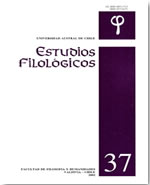The idiomatic impact of several globalizations
Main Article Content
Abstract
I start studying the present globalization from the point of view of its name, momentum, major emphasis, the kind of human being it promotes, the dominant language that goes with it and the main vehicle it uses. I also consider especially its idiomatic impact. These seven characteristics are later applied, in a retrospective way, to the times of Alexander the Great, to the beginning of Christianity under Roman rule, to the Spirit of the Crusades, to the Conquest of the New World, to the Age of Enlightenments and to the Cosmopolitism as found at the end of the XIX Century and the beginning of the XXth. This similar confrontation of several "universal" movements, also seven in total, underlines, on the one hand, similarities of those epochs in terms of understanding the "global", and on the other hand, explains the peculiarities of each one.

